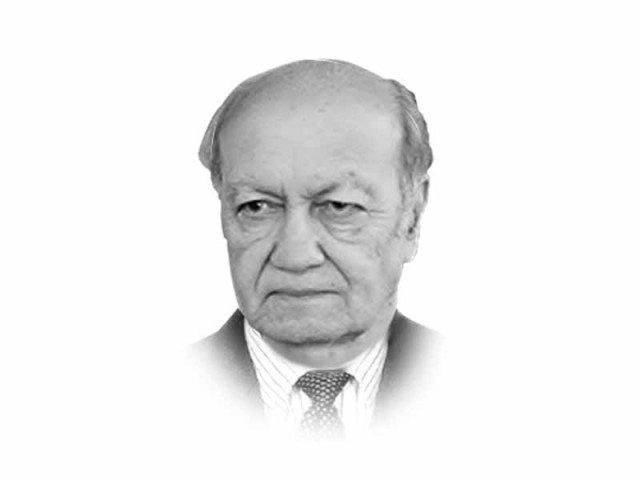Assessing the quality of democracy in Pakistan
Political parties will have to considerably improve their economic, political and security governance.

The writer is a retired lieutenant general of the Pakistan Army and served as chairman of the Pakistan Ordnance Factories Board
He brought out in the same article how electoral democracies have proliferated from 35 in 1974 to 120 in 2013. And even dictatorships such as those in Egypt or Venezuela would like to legitimise themselves under the cover of elections, however fraudulent these may be.
With Achakzai warning us of ominous clouds hovering over democracy, we need to take stock of our state of democracy and the dangers that it faces due to the machinations of Tahirul Qadri and his collaborators at home. In any case, for a country to be reminded of a possibility of a military takeover is the most debilitating experience.
The future of democracy in Pakistan will largely depend on how political parties evolve and politicians conduct themselves in coming years. A major factor that strengthens democracy and normalises civil-military relations is the quality of governance. And what we are experiencing is that both at the provincial and federal level our political leadership has seriously neglected governance.
The PPP seems to have been really orphaned after the assassination of Benazir Bhutto. Although during its heyday the party was never known for running an efficient administration, even judging from its past standards there was steep decline in the performance of the last PPP governments both at the centre and in the two provinces where they were in power. The type of leadership provided by Asif Zardari is neither helpful in running the affairs of the government nor leading a political party. Retaining power within a small coterie of loyalists results in merit being compromised. This approach marginalises the best in the PPP. By setting low standards of governance and compromising on principles during the last five years in office, the PPP destroyed the party’s ethos. No doubt, it can take credit for successfully completing a full five-year term but democracy’s long-term sustainability depends as much on the continuity of the process as on performance. Considering that Pakistan today has 50 per cent of its population under the age of 35, the party should cater to the aspirations of this generation and have younger leadership among its cadres. Grooming Bilawal Bhutto and expecting that he would be able to lead the party would only partly address the problem of future leadership. Bilawal surely should be given a place of eminence provided he fulfills the criteria on merit. Although the PPP election manifesto for the 2013 elections spelled out fairly ambitious goals, the style and substance of governance bears hardly any relation to it. The party, to regain its position, will have to revive its organisation and cadres in Punjab, K-P and Balochistan and bring about a qualitative change in governance in Sindh.
The PML-N’s performance in Punjab is clearly better when compared to the other provinces, but at the federal level, its performance has many shortcomings. First, a country of over 180 million people and total area of 803,940 square kilometres cannot be run on a personalised basis.
Nawaz Sharif’s approach towards security governance, until recently, has been weak and could have been his Achilles’ heel. He delayed the decision to launch a military operation in North Waziristan until the unfortunate incident at Karachi airport. It seems that Nawaz Sharif, apart from fearing a backlash in Punjab, also felt that a major military operation in North Waziristan would further enhance the power of the military. This indecisiveness, had it continued, could have been a dangerous prelude to Nawaz Sharif finding himself on the wrong side of both the military and militants. His government also cannot remain an idle spectator to the indiscriminate killing of Shias and other minorities.
Building metros and highways is fine and the country needs to develop its infrastructural facilities. But if these are built with Chinese assistance and Saudi benevolence and not by generating wealth from within by widening the tax base, then the country has a problem.
The PTI’s current strategy appears to concentrate more on developing street power than on governance in K-P. It is unfortunate, considering that it is one party that has no baggage, is popular among the youth and has an incorruptible leader. What is needed is to close the wide gap between the stated vision of the party and its current performance. The Tehreek-e-Insaf being the party in power in K-P, Imran Khan’ s cautious approach in dealing with terrorism and insurgency is understandable. But a time comes in the life of nations when leaders have to take tough decisions in the long-term interests of their people and the integrity of the state. And this is surely that moment.
In Pakistan, we have been able to keep the process of electoral democracy going but to keep moving on the upward escalator, political parties will have to considerably improve their economic, political and security governance.
Published in The Express Tribune, June 18th, 2014.
Like Opinion & Editorial on Facebook, follow @ETOpEd on Twitter to receive all updates on all our daily pieces.















COMMENTS
Comments are moderated and generally will be posted if they are on-topic and not abusive.
For more information, please see our Comments FAQ